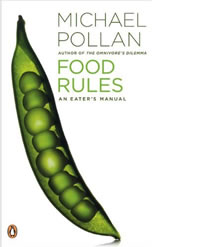Book Notes
 Michael Pollan, Food Rules; An Eater's Manual (New York: Penguin Books, 2009), 140pp.
Michael Pollan, Food Rules; An Eater's Manual (New York: Penguin Books, 2009), 140pp.
This tiny treatise is so small that it barely qualifies as a book, but it carries a big message that could revolutionize your diet. Michael Pollan is a professor of journalism at the University of California at Berkeley, and with his two best sellers The Omnivore's Dilemma (2006) and In Defense of Food (2008) he established himself as a worthy food guru. In the first book he considered "the ecological and ethical dimensions of our eating choices," or as one reviewer put it, balancing the demands of appetite and conscience. The mantra of the latter book contained seven words and three rules: "Eat food. Not too much. Mainly plants."
In the introduction to his newest book, Pollan observes how the simple act of eating has become way too complex. We rely on experts to advise us, try to pronounce five syllable words on food labels, and wonder which fats are good or bad. This is both unfortunate and unnecessary, for in his decades of food study, "the picture got simpler the deeper I went." Two empirical facts are indisputable — (1) people who eat a "Western" diet loaded with sugar, fat, salt, and highly processed foods experience far higher rates of preventable diseases, whereas (2) people who eat any number of widely different "traditional" diets are healthier. The "bottom line" is to move from the first category to the second. You can do this by following those seven little words from In Defense of Food. Those seven words provide the three-part structure for Pollan's how-to book.
To become a healthy and happy eater, Pollan lists sixty-four rules for eating. What should you eat? Eat food. Don't eat highly processed "edible foodlike substances," "industrial novelties," or "foodish products" with "wordoids" like "lite." So, for example, rule #7: "Avoid food products containing ingredients that a third-grader cannot pronounce." Or rule #19: "If it came from a plant, eat it; if it was made in a plant, don't." Or rule #21: "It's not food if called by the same name in every language. (Think Big Mac, Cheetos, or Pringles.)." What kind of foods should we eat? Mainly plants. Rule #36: "Don't eat breakfast cereals that change the color of the milk." And how should we eat? Not too much. Rule #44: "Pay more, eat less." Or rule #57: "Don't get your fuel from the same place your car does." And rule #60: "Treat treats as treats." Whatever you do, don't obsess about food. Consistency and everyday practices are more important than perfection. And so rule #64: it's okay to "Break the rules once in a while."


